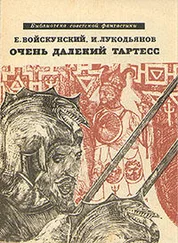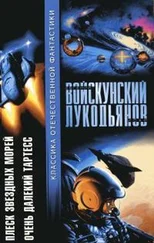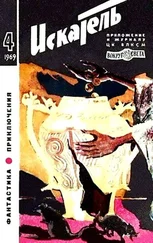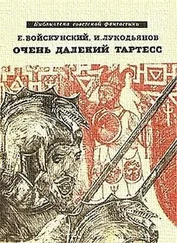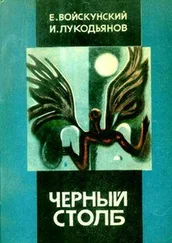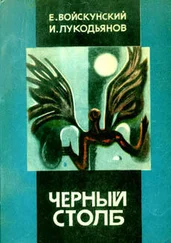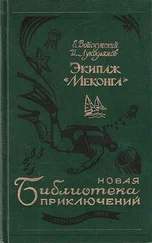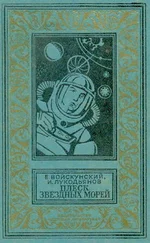Исай Лукодьянов - The Black Pillar
Здесь есть возможность читать онлайн «Исай Лукодьянов - The Black Pillar» весь текст электронной книги совершенно бесплатно (целиком полную версию без сокращений). В некоторых случаях можно слушать аудио, скачать через торрент в формате fb2 и присутствует краткое содержание. Город: Moscow, Год выпуска: 1968, Издательство: MIR Publishers, Жанр: Фантастика и фэнтези, на английском языке. Описание произведения, (предисловие) а так же отзывы посетителей доступны на портале библиотеки ЛибКат.
- Название:The Black Pillar
- Автор:
- Издательство:MIR Publishers
- Жанр:
- Год:1968
- Город:Moscow
- ISBN:нет данных
- Рейтинг книги:3 / 5. Голосов: 1
-
Избранное:Добавить в избранное
- Отзывы:
-
Ваша оценка:
- 60
- 1
- 2
- 3
- 4
- 5
The Black Pillar: краткое содержание, описание и аннотация
Предлагаем к чтению аннотацию, описание, краткое содержание или предисловие (зависит от того, что написал сам автор книги «The Black Pillar»). Если вы не нашли необходимую информацию о книге — напишите в комментариях, мы постараемся отыскать её.
© god54
The Black Pillar — читать онлайн бесплатно полную книгу (весь текст) целиком
Ниже представлен текст книги, разбитый по страницам. Система сохранения места последней прочитанной страницы, позволяет с удобством читать онлайн бесплатно книгу «The Black Pillar», без необходимости каждый раз заново искать на чём Вы остановились. Поставьте закладку, и сможете в любой момент перейти на страницу, на которой закончили чтение.
Интервал:
Закладка:
"You're right, Ali-Ovsad," said Olovyannikov, laughing. "I recognize our newspaper style. We're experts at turning people into monuments."
"Good chap, that was well said!" Ali-Ovsad raised a gnarled finger. "Turning a man into a monument. Why write words like that? Are there no other words?"
"There are, Ali-Ovsad. But that's what's difficult: to find other words, the right words. We don't always succeed when we're in a rush."
"Well, don't be in a rush. If everybody rushes when they work, the work will suffer."
Tokunaga, Morozov, Bramulla, and two men that Kravtsov did not know, came into the saloon, and sat down at the chairman's table. Conversation dropped.
Tokunaga rose. A flashbulb blazed. The high-pitched voice of the Japanese resounded through the hushed saloon.
"Ladies and gentlemen of the press. In the name of the Presidium of the IGY it is my privilege to open this press conference. But I must say at once that so far we are only able to give you preliminary information and certain hypotheses which-and I emphasize this-do not in any way claim to represent the absolute truth and need to be checked many times over."
Two interpreters translated the smooth, rather formal speech of the Japanese into Russian and English.
"So, what has happened?" continued Tokunaga. "Six years ago drilling operations on the ultra-deep borehole stopped at a depth of forty-two kilometres under the sea. The bit ceased to cut into the rock and it became impossible, for some inexplicable reason, to raise the drill pipes. You may recollect, ladies and gentlemen, the controversies and hypotheses of those days. We drew up an international rota to keep watch at the borehole, and were fully justified in doing so; for now, after six years, a new and more serious event has taken place. But first I must remind you that the borehole was being drilled at the bottom of a deep trench where, according to our calculations, the crust of the Earth was much less thick. Did the borehole penetrate a deep fissure, has plasma drilling disturbed the lower strata? We do not know.
"It may be surmised that the black pillar is a substance from the deepest strata which is in a state of plasticity under the action of enormous pressure; somewhere it found a weak spot and began to rise, towards the boundary of the crust. Meeting the borehole on its way, it began slowly, and then faster and faster, to rise to the surface. Someone has aptly compared this with the squeezing of toothpaste from a tube. The substance, as you know, squeezed the string of pipes from the borehole and now, having considerably widened it, continues to rise in the form of a pillar leaning slightly towards the west. The chemical composition and physical structure of the pillar are as yet unknown. You see, ladies and gentlemen, many scientists consider that the Mendeleyev table is true only for ordinary temperatures and pressures. But at great depths, where there are enormous pressures and very high temperatures, the structure of the electronic shell of the atom changes: the orbits of the electrons are pressed in on them, so to speak. And at still greater depths the electronic shells of the atoms are mixed. There all the elements acquire entirely new properties. There is no iron there, no phosphorus, uranium, iodine, there are no elements, but only some sort of universal substance of a metallic character. That is our supposition. You probably know that our attempt to obtain a sample of the matter of the pillar failed, unfortunately. Of one thing, however, there is no doubt: this substance possesses extraordinary properties."
XIX
It was past midnight when Kravtsov left the smoke-filled saloon.
His head ached and his back. Perhaps he ought to see the doctor and get some pills. But where could anyone hope to find the sick-bay in this floating city?
Ali-Ovsad and Olovyannikov had got lost in the crowd of reporters who had rushed to the radio cabin at the end of the conference.
Kravtsov did not quite know in which passage his cabin was. He went down the first staircase he saw and found himself in another empty passage fitted with a jute carpet. Doors, doors and more doors. But their numbers were even; he must go over to the other side. He certainly must learn to find his way about the "Fukuoka Maru" and know where everything was. He was quite obviously going to spend more than a couple of days on her.
He shuffled along the passage, feeling ready to drop, and tiresome tune kept running in his head: "The grass has grown on the paths and tracks where my dear love's feet once trod."
Somewhere ahead he heard a snatch of conversation in English, followed by a burst of laughter. Then he heard the melancholy twang of a banjo. The door of one of the cabins was flung open and the stocky Texan (his head still in a bandana), and two riggers from Parkinson's crew came out into the passage-very much the worse for liquor.
"Hi, engineer!" exclaimed the stocky one. "What have you and the learned gentlemen thought up?"
"We haven't thought up anything yet," replied Kravtsov, wearily.
"Got away, that means you're being paid for nothing!"
Kravtsov glanced at the flushed, excited face of the Texan and moved on in silence. But one of the riggers stopped him.
"Just a second,.sir. Fletcher here," he indicated the Texan with a jerk of his head, "would like to know whether this damned pillar will fall on America. He's got a lot of relations in America, sir, and he's afraid…"
"Let him write and tell them to put props over their houses," replied Kravtsov.
The men went into gales of laughter. Jim Parkinson, with his banjo, stuck his head out of the next cabin, nodded to Kravtsov and said, "Go to bed, Fletcher."
"I would," answered the Texan, grinning. "Only I'm afraid I'll turn yellow in my sleep."
More yells of laughter.
With a racking headache and his face twisted with pain, Kravtsov lagged himself along the passage. "The grass has grown on the paths and tracks, where the wild cats once trod."
He turned into a side passage and nearly collided with Ali-Ovsad.
"Ai, balam! Where are you off to? I've been there, that's not our street. Such a big ship-they need a policeman at the corner."
"You're right. Where does this staircase lead?"
They went up the stairs and found themselves on the upper deck. They were on more familiar ground there. Then they went up on the spardeck and sat down, or rather, lay down in deckchairs.
The ship rocked and creaked. In the rays of the toplights they could see how low the dark clouds were as they drifted overhead.
"It'll rain," said Ali-Ovsad.
Inhaling the cool night air, Kravtsov gazed at the clouds as they scudded past above the ship.
"What rubbish was that Fletcher talking?" he thought. " 'I'm afraid of turning yellow in my sleep.' What does it mean?"
"Sasha," said Ali-Ovsad. "Remember what that fat journalist asked? Whether God was angry with the drillers and sent the black pillar."
Kravtsov smiled as he remembered the question put by the correspondent of the "Christian Century"-was not the pillar a divine omen-and Tokunaga's reply that in view of the absence of adequate proof of the existence of gods and the lack of time, he would ask that correspondents' questions be relevant to the subject under discussion.
"So well dressed, looked like a cabinet minister, but doesn't know there's no God," Ali-Ovsad clicked his tongue. "And I thought he was a cultured man."
"There are all sorts in the world, Ali-Ovsad. Your friend Bramulla, for instance, also has the habit of addressing the Lord God."
"Humph! That's just habit. I didn't quite understand, Sasha,-why did the Japanese mention Hiroshima?"
"Hiroshima? Well, that chap in the gaudy shirt-from the 'New York Post', I think,-asked where energy comes from. Something like that. So Tokunaga replied that according to Einstein energy is equal to the product of mass into the square of velocity of light in space, and that consequently a gramme of any substance possesses a latent energy-over twenty million million calories I think,-which can be manifested in endless ways. And then he added that they-the Japanese, that is-had made acquaintance with a particular manifestation of this energy in Hiroshima."
Читать дальшеИнтервал:
Закладка:
Похожие книги на «The Black Pillar»
Представляем Вашему вниманию похожие книги на «The Black Pillar» списком для выбора. Мы отобрали схожую по названию и смыслу литературу в надежде предоставить читателям больше вариантов отыскать новые, интересные, ещё непрочитанные произведения.
Обсуждение, отзывы о книге «The Black Pillar» и просто собственные мнения читателей. Оставьте ваши комментарии, напишите, что Вы думаете о произведении, его смысле или главных героях. Укажите что конкретно понравилось, а что нет, и почему Вы так считаете.

